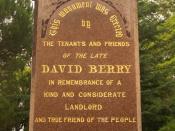List of Tenant Rights
In New South Wales, under the Residential Tenancies Act of 1987, tenants are entitled to:
- A copy of the residential tenancy agreement, including a completed condition report.
- Rented premises, in a reasonable state of cleanliness, that are fit to live in.
- A copy of all receipts (unless rent is paid in a nominated bank account).
- The knowledge that rent cannot be increased at all during a fixed term agreement, unless stated in the residential tenancy agreement.
- 60 days written notice of a rent increase.
- Have quiet enjoyment and use of the premises.
- Have reasonable locks and security.
- Have reasonable maintenance and repairs carried out.
- Written notice if the landlord wishes to end the agreement.
- Be notified of any changes to the landlord (or agent's) name and address.
- Refuse the landlord access to the premises, except in limited circumstances and with proper, written notice.
- Privacy, whereby the landlord may not enter premises on a Sunday, a public holiday or before 8am and after 8pm, without the tenant's permission.
- Apply to the Residential Tenancies Tribunal if the landlord breeches the agreement.
- Stay in the premises until the Tribunal ends the tenancy by order.
In addition:
- An auction cannot be held on the premises unless the tenant agrees, AND;
- On being informed by the tenant, he landlord is obliged to organise and pay for any urgent repairs, as soon as is reasonably possible. However, if urgent repairs are not carried out within a reasonable period, the tenant can arrange to have the problem fixed themselves and spend up to $500 doing so. In this case, the tenant must inform the landlord or agent in writing of the amount spent on repairs...


